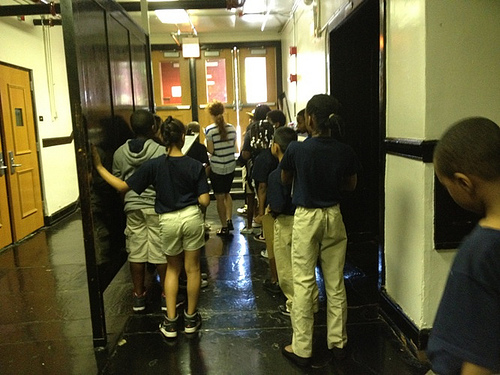
Education of the Exceptional Child
[flickr id=”7167609089″ thumbnail=”medium” overlay=”true” size=”original” group=”” align=”none”]
Summer classes in the education department are quite a blur. I’m three weeks in, and I feel like we’ve just begun. I suspect it’s because we take the same class three days in a row. We are currently very immersed in the subject of educating exceptional children. I had given it thought before, as we often talk about differentiated instruction. I had never heard of the concept of the Least Restrictive Environment (LRE), however, until this class. What it means is a pretty simple concept, but very difficult to determine for each child. Basically, it is ideal that all students be educated in a general education classroom so that they are given the best opportunity possible to succeed academically and socially. When teachers, administrators and support staff are making decisions for students with disabilities, the goal is to include them in the regular classroom as much as possible. This was not the case when I was a kid, so the concept of LRE was surprising to me.
[flickr id=”7167609063″ thumbnail=”medium” overlay=”true” size=”original” group=”” align=”none”]
Our observation for the summer was to view a regular classroom and to determine what sort of accommodations and modifications are made for students with Individualized Education Programs (IEPs). I heard similar comments from both the Special Education instructor and the General Education teacher; namely, that there is simply not enough support in any school for special education to truly succeed. The teacher noted that special education isn’t really valued in our society as a whole. It seemed to me that the school and the teachers were doing their very best to help these students move forward in their education, but it was sad to hear that these teachers feel that they aren’t doing enough for the kids.
[flickr id=”7352818814″ thumbnail=”medium” overlay=”true” size=”original” group=”” align=”none”]
I feel confident that I will be able to come up with smart strategies to teach to all different learning styles and abilities in my future classroom. I am patient, I am thoughtful, and I have a creative background that lends itself to helping students express themselves. While I feel confident in myself, however, I now think it will be incredibly important for me to ask about the special education support services offered at any school where I interview. Being successful as a teacher, after all, is not an individual practice. It takes a community with different funds of knowledge to really support students.
[flickr id=”7352818900″ thumbnail=”medium” overlay=”true” size=”original” group=”” align=”none”]
One thing I learned from the teacher on these observations that I’d never heard before was that at the beginning of the year it is absolutely essential to help students take ownership of their education. She said that when kids know that the choices you make as an educator are to help them as an individual be successful, that they are more willing to step up and take the initiative with their learning. I hope to employ that idea in the future!
